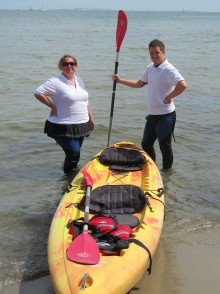A new report from Dorset Wildlife Trust’s (DWT) seagrass rangers has revealed that after speaking to 200 boaters in Studland Bay, 9 out of 10 said they were aware of marine wildlife beneath their keels, and 94% agreed that the marine wildlife should be protected.
However, fewer were aware of the bays importance as a nursery area for fish or the role seagrass plays in protecting the coast from erosion.
The report also stated that 83% listed ‘shelter’ as the biggest attraction to visit South Beach at Studland Bay, and over half said a ‘quiet’ area was the most important factor when choosing where to anchor.
The seagrass rangers spent this summer kayaking around Studland bay and visiting local marinas, talking to boat owners. Rangers wanted the opinions of owners on the best way to manage the site for the benefit of both people and wildlife and also handed out a new best-practice guide to anchoring in seagrass areas, which was produced by the RYA (Royal Yachting Association) with input from DWT.
Studland seagrass ranger, Lynn Marsland said, “We have enjoyed talking with a wide range of boat owners at Studland over the summer and met some very friendly and interesting people with a wealth of knowledge. The marine users are very keen to continue visiting the area and had some excellent suggestions for management options to enable this, from voluntary no-anchor zones to eco-friendly moorings and enforcement of speed restrictions.”
Studland Bay has been recommended to become a Marine Conservation Zone as part of a new network of marine wildlife refuges that together, if properly managed, would help boost the health of our British seas and sealife, as well as supporting tourism and the enjoyment of boat owners. The Studland Bay MCZ has however been put on hold by the Government. The rangers also investigated the potential for local businesses and organisations to sponsor eco-moorings in the bay as an alternative to dropping anchor. Eco-friendly moorings are widely used in other parts of the world to protect sensitive seabed wildlife such as coral reefs and seagrass meadows.
To read the full report, please visit www.dorsetwildlifetrust.org.uk/studland.







